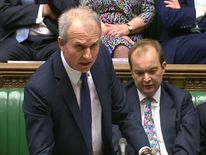We have been out for a while due to technical issues .... we are back to give you the very best service. Thanks for your understanding .
Wednesday, 19 December 2018
Friday, 12 August 2016
Fleeing Mosul
A humanitarian nightmare looms as hundreds of thousands are set to escape an offensive against Islamic State
Up to a million people are trapped
in the Islamic State-controlled city of Mosul. As Iraqi, Kurdish and
tribal forces close in, men, women and children are expected to come
streaming out. Protecting them will be one of the largest, most complex
humanitarian operations in the world.
Kurdish forces are approaching from the east, pushing their front line into IS’s backyard. Iraqi forces edge up from Baghdad north toward Mosul, slowly taking village after booby-trapped village as coalition jets bomb IS targets.
People are already desperately trying to flee the fighting.
Kurdish forces are approaching from the east, pushing their front line into IS’s backyard. Iraqi forces edge up from Baghdad north toward Mosul, slowly taking village after booby-trapped village as coalition jets bomb IS targets.
People are already desperately trying to flee the fighting.
According to the United Nations,
IS last week captured some 3,000 people trying to escape the fighting
south of Mosul. Some are being used as human shields. Some were shot,
others blown up, and there are reports that IS burned some alive.
The incident took place near Hawija, just east of the corridor laid out for the thousands expected to flee the looming battle for Mosul.
Families that have managed to escape are filling up camps in the surrounding area to bursting, as humanitarian agencies rush to build more, creating bleak landscapes of off-white tents and grey concrete blocks.
Adding to their misery is suspicion. Civilians previously fleeing IS were considered victims; the people of Mosul have been living under IS for more than two years and are seen by some as collaborators.
The incident took place near Hawija, just east of the corridor laid out for the thousands expected to flee the looming battle for Mosul.
Families that have managed to escape are filling up camps in the surrounding area to bursting, as humanitarian agencies rush to build more, creating bleak landscapes of off-white tents and grey concrete blocks.
Adding to their misery is suspicion. Civilians previously fleeing IS were considered victims; the people of Mosul have been living under IS for more than two years and are seen by some as collaborators.
Lise Grande, the UN
Humanitarian Coordinator for Iraq, said humanitarian agencies are
working to do everything possible to protect the civilians still in
Mosul.
“We are doing in depth, detailed planning with the military and civilian authorities,” Grande told VOA.
Conflicting political objectives of the Baghdad government, the Kurdish Regional Government, and the pro-Sunni former governor of Ninewa, where Mosul is located, have complicated the operation.
“The unstable relationship (between) the central government in Baghdad and the local government will have a main role in creating conflicts,” one Iraqi analyst with a local non-governmental organization working on Mosul told VOA.
“The conflict between the political parties on power [sharing] will also have a negative role on social integration after the liberation of Mosul,” the analyst said, asking to remain anonymous.
Iraq’s complex political and military divisions mean that the area around Mosul has been “divided” into four quadrants through which civilians would have to travel. Each has its own mix of military and civilian authorities, and its own unique and specific protection issues.
“We are doing in depth, detailed planning with the military and civilian authorities,” Grande told VOA.
Conflicting political objectives of the Baghdad government, the Kurdish Regional Government, and the pro-Sunni former governor of Ninewa, where Mosul is located, have complicated the operation.
“The unstable relationship (between) the central government in Baghdad and the local government will have a main role in creating conflicts,” one Iraqi analyst with a local non-governmental organization working on Mosul told VOA.
“The conflict between the political parties on power [sharing] will also have a negative role on social integration after the liberation of Mosul,” the analyst said, asking to remain anonymous.
Iraq’s complex political and military divisions mean that the area around Mosul has been “divided” into four quadrants through which civilians would have to travel. Each has its own mix of military and civilian authorities, and its own unique and specific protection issues.
In quadrant one,
a crescent moon-shaped area to the east of Mosul, Iraqi Kurdish
Peshmerga are the military authority, and the Kurdistan Regional
Government is the civilian authority. The KRG has already said it is
going to control the movements of those fleeing the violence into this
area, so displaced families will be screened, then likely restricted to
specific camps.
In quadrant two, a triangle to the northwest of Mosul, the Iraqi Kurdish Peshmerga are again the military authority, while the Government of Iraq is technically the civilian authority. It is unclear how these two authorities will coordinate.
In quadrant three, a rectangle west of Mosul headed towards Syria, is an area currently under IS control, but is expected to be an active military zone. Civilians fleeing in this direction will most likely be IS supporters, or those fearing revenge killings by Shi’ite militias taking part in the fighting. Protecting these civilians will be difficult.
In quadrant four, a long thin strip following the Tigris River south towards Tikrit, the Government of Iraq will be both the military and civilian authority. Up to 400,000 civilians could use this route to escape the fighting, but authorities are expected to separate the men and boys for security screening at Qayyarah, creating a possible bottleneck.
In quadrant two, a triangle to the northwest of Mosul, the Iraqi Kurdish Peshmerga are again the military authority, while the Government of Iraq is technically the civilian authority. It is unclear how these two authorities will coordinate.
In quadrant three, a rectangle west of Mosul headed towards Syria, is an area currently under IS control, but is expected to be an active military zone. Civilians fleeing in this direction will most likely be IS supporters, or those fearing revenge killings by Shi’ite militias taking part in the fighting. Protecting these civilians will be difficult.
In quadrant four, a long thin strip following the Tigris River south towards Tikrit, the Government of Iraq will be both the military and civilian authority. Up to 400,000 civilians could use this route to escape the fighting, but authorities are expected to separate the men and boys for security screening at Qayyarah, creating a possible bottleneck.
There is also the question of the Hashd al Shaabi, an umbrella group of Shi'ite militias.
The Hashd al Shaabi have been accused of illegally interrogating, and torturing and executing Sunni males during the recent military operation in Fallujah. Iraqi Prime Minister Haider al Abadi has said the government is investigating, but some 1,000 men remain unaccounted for.
The Hashd al Shaabi have been accused of illegally interrogating, and torturing and executing Sunni males during the recent military operation in Fallujah. Iraqi Prime Minister Haider al Abadi has said the government is investigating, but some 1,000 men remain unaccounted for.
According to the Institute for the
Study of War, major Iranian-backed Shi’ite militias are already seeking
to formalize their participation in operations in northern Iraq. The
US-led coalition, Kurdish and Ninewa officials will likely resist
letting Shi’ite militias to deploy in the area out of fear of sectarian
reprisals.
“There is a huge amount of work going into getting the Hashd al Shaabi to play an appropriate role,” said a Western diplomat familiar with the planning process. “Any kind of retribution, any form of retaliation that is outside the judicial process will make reconciliation that much harder. It is clearly unacceptable.”
“There is a huge amount of work going into getting the Hashd al Shaabi to play an appropriate role,” said a Western diplomat familiar with the planning process. “Any kind of retribution, any form of retaliation that is outside the judicial process will make reconciliation that much harder. It is clearly unacceptable.”
Some officials say there is simply not enough money
available to provide food, water, shelter, medical, and sanitation
needs for the hundreds of thousands of men, women and children expected
to quickly flood into the region and be stuck there, likely for months.
The U.S. and international donors have raised roughly $590 million for the entire humanitarian effort across Iraq. With Mosul expected to add another million to the already 3.3 million displaced in the country, some aid officials believe that is simply not enough.
The Iraqi analyst agreed that the expected refugee situation will require substantial international support, but criticized UN agencies for wasting resources. “The lack of good coordination between all the international NGOs also causes repetition of distribution of relief items to one area, while in other areas there is no distribution,” he said.
No one is willing to predict how the military operation in Mosul will play out, or even how the civilians living under the IS extremists will react.
Grande says the UN is asking authorities to do everything possible to protect civilians, control the flow of people leaving Mosul, use military tactics that will result in the fewest number of casualties and ensure that civilians are screened humanely by appropriate authorities.
Yet even if those points are heeded, the assault on Mosul ultimately presents a horrific choice: a fast moving military attack that could potentially cause high casualties or a careful, drawn-out siege, in which tens of thousands could face starvation.
The U.S. and international donors have raised roughly $590 million for the entire humanitarian effort across Iraq. With Mosul expected to add another million to the already 3.3 million displaced in the country, some aid officials believe that is simply not enough.
The Iraqi analyst agreed that the expected refugee situation will require substantial international support, but criticized UN agencies for wasting resources. “The lack of good coordination between all the international NGOs also causes repetition of distribution of relief items to one area, while in other areas there is no distribution,” he said.
No one is willing to predict how the military operation in Mosul will play out, or even how the civilians living under the IS extremists will react.
Grande says the UN is asking authorities to do everything possible to protect civilians, control the flow of people leaving Mosul, use military tactics that will result in the fewest number of casualties and ensure that civilians are screened humanely by appropriate authorities.
Yet even if those points are heeded, the assault on Mosul ultimately presents a horrific choice: a fast moving military attack that could potentially cause high casualties or a careful, drawn-out siege, in which tens of thousands could face starvation.
Monday, 1 August 2016
Moyes Faces 'Building Job' At Sunderland

David Moyes conducts his first press conference as Sunderland manager
David Moyes admits he has taken on a "building job" at Sunderland and hopes to lure Manchester United duo Marouane Fellaini and Adnan Januzaj to the Stadium of Light.
Moyes was confirmed as new England manager Sam Allardyce's successor on 23 July and has spent the past 10 days getting to know his squad ahead of the new Premier League season.
Sunderland are yet to strengthen this summer, but Moyes confirmed he and chief executive, Martin Bain, are working hard to add new faces to the squad and declared his interest in Fellaini and Januzaj.
When asked whether he would like to bring the pair to Sunderland, Moyes said: "If anyone of those players want to join us, I would be happy to have them because they are excellent players.
"We are interested, but I am sure a host of other clubs are too."
Moyes has signed Fellaini twice before during his spells in charge of Everton and Manchester United, and also handed Januzaj his United debut against Sunderland, when the Belgium international scored twice in a 2-1 win on Wearside in 2013.
As well as discussing the difficulty of securing transfer targets, Moyes also stressed his desire to bring stability to Sunderland, who have successfully battled against relegation in each of the past four seasons.

Moyes is interested in Manchester United duo Marouane Fellaini and Adnan Januzaj
"The FA have been speaking to Sam for a few weeks, so I don't know how much business you can do in that period, you've got to give us a bit of grace on that," Moyes, who signed a four-year deal at Sunderland, added.
"It does take a little bit of time, they only avoided relegation late in the season, so it's hard to get things in place. But we'll turn it around and we'll get signings in. We've got offers in just now and I am hoping to get things done quite quickly.
"It doesn't always work like that, anyone who you talk to about football says it's a difficult window, I think it's a difficult window because of the prices.
"We're not going to hide the facts, Sunderland finished 17th and 16th over the past couple of seasons, so this has to be a building job.
"Hopefully I am here for four years and I can bring a level of stability to the club. It reminds a bit of when I took over at Everton.
"Everton had been in the bottom six for the past four or five years before I came in, so there's a similarity there.
"But you are not going to change it in a couple of days or one transfer window and if we are a little late in the transfer market, we'll do the best we can.
"We want to get the right players at the right price and players that want to go on the journey with us."
Mexican Banks Tighten Lending to States as Graft Concerns Surface
FILE - Mexican Finance Minister Luis Videgaray (C), Mexico's Economy Minister Ildefonso Guajardo (R) and Deputy Governor of the Bank of Mexico Roberto del Cueto attend a news conference in Mexico City, Mexico, June 24, 201
MEXICO CITY —
Mexican banks, determined to avoid a return to past woes, are reining in lending to the country's indebted state governments, some of whose leaders have recently become the focus of corruption allegations.
The drop in bank lending to the states this year has been the sharpest since the 2007-2009 financial crisis, and coincides with a jump in liabilities in several states in the past five years.
In the first half of 2016, commercial banks agreed 11 loans to local and state governments worth 8.471 billion pesos ($451 million), less than half the sum from the same period in 2015, when 32 loans went out, according to finance ministry figures.
This year's decline was the steepest since 2009, when the financial crisis pushed Mexico into recession, the data show.
Four states — Veracruz, Quintana Roo, Nuevo Leon and Chihuahua — accounted for close to half of the 70 percent jump in local government liabilities between 2010 and 2015, which stood at 536 billion pesos ($28.52 billion) at the end of December.
"We now have more cautious policies to avoid cases of over-indebtedness," said Armando Acevedo, the executive in charge of local lending at Grupo Financiero Interacciones, a major lender to states and municipalities.
In June, Moody's downgraded GFI's ratings, citing "rising asset risks deriving from the bank's large exposures to Mexican regional and local governments."
And over the next six weeks, Moody's did the same to Veracruz and Chihuahua, while Quintana Roo, home to tourist hub Cancun, had its outlook lowered by Standard & Poor's.
Mexico has suffered two major financial crises in recent decades — in 1982 following a national default, and in 1994-1995, which was accompanied by a sharp currency devaluation.
The Mexican government insists there is no problem, and a law passed in April means lending rules are now tighter.
"I detect a much more analytical banking sector," said Marcela Andrade, head of the Finance Ministry unit responsible for coordinating with local governments. "It's more obvious they're looking more at who they lend to."
Political fallout
Banks insist they are not retreating from regional borrowers, which are dominated by the 31 states and Mexico City.
"What we have done is be much more careful about which states we're lending to," said Luis Robles Miaja, board president of BBVA Bancomer in Mexico.
Another top Mexican financier, speaking on condition of anonymity, told Reuters that he was seriously concerned about corruption and financial mismanagement in states including Veracruz, and had sought to reduce his exposure.
Signs of retrenchment are evident.
Between December 2015 and June 2016, commercial banks' total outstanding loans among states and municipalities dropped 3.1 percent to 324.3 billion pesos, according to central bank figures. In contrast, their loans to the private sector rose 5.6 percent to 3.477 trillion pesos.
Local governments account for a small fraction of total liabilities, but allegations of corruption have been punished by voters in the four states at the center of debt concerns.
Ruled by President Enrique Pena Nieto's PRI going into 2015, Veracruz, Quintana Roo, Nuevo Leon and Chihuahua have all since fallen to the opposition, which has accused the outgoing governors of fraud or embezzlement. They deny the allegations.
There are even fears some states could need a bailout.
"Veracruz is broke," said Armando Rios Piter, senior member of the Senate finance committee in the center-left opposition Party of the Democratic Revolution, which captured the state in coalition with the center-right National Action Party in June/
Mother of Rescued Nigerian Schoolgirl Fears for Her Future
FILE - Nigeria President Muhammadu Buhari, second right, receives Amina Ali, the rescued Chibok school girl, at the Presidential palace in Abuja, Nigeria, May. 19, 2016.
ABUJA — 

Held for months by the Nigerian government and confined to a house in the capital for the foreseeable future, Amina Ali, a schoolgirl who was rescued after two years in Boko Haram captivity, may never be the girl she once was, her mother fears.
Amina, one of more than 200 girls abducted from a school in Chibok in April 2014, and her four-month-old baby were rescued in May near Damboa in the remote northeast, by soldiers working together with a civilian vigilante group.
After a meeting with President Muhammadu Buhari, in the hope she would shed light on the fate of the other kidnapped girls, Amina has since been held in a house in the capital Abuja for what the Nigerian government has called a "restoration process."
But her mother, Binta Ali, who has spent the last two months in the house, is concerned about Amina's welfare and future.
"Before she was kidnapped, she wanted to further her education," Binta told the Thomson Reuters Foundation from Chibok, having briefly returned there to seek medical treatment.
"But now she is afraid of schooling, and she wants to be close to me at home," said Binta, adding that Amina wants a sewing machine so that she can start a business making clothes.
FILE - Rescued "Chibok girl" Amina Ali is shown seated and wearing a veil before a news conference at the presidential villa in Abuja, Nigeria, May 19, 2016. (C. Stein/VOA)
Binta said she was also worried that her daughter was being pressured into following Islam, having been forced to convert from Christianity to Islam by Boko Haram militants during her captivity.
"Amina herself does not want to remain a Muslim," Binta said, explaining how an Islamic teacher had visited the house several times and told her daughter to maintain her new faith.
"She did not want to see him," Binta said, adding that the teacher had stopped visiting after she complained about him.
Garba Shehu, Buhari's spokesman, said that Amina's confinement in the house had nothing to do with religion.
‘No longer afraid’
Boko Haram kidnapped 219 girls from their school in Chibok, northeast Nigeria, in April 2014, as part of their seven-year-old insurgency to set up an Islamic state in the north that has killed some 15,000 people and displaced more than 2 million.
Some girls escaped in the melee but parents of those still missing accused former President Goodluck Jonathan, Nigeria's then leader, of not doing enough to find their daughters, whose disappearance sparked a global campaign #bringbackourgirls.
Binta said she was shocked to hear about the hardships faced by her daughter as a captive of the Islamist group.
FILE - The rescued Chibok school girl, Amina Ali, was airlifted by Nigeria Air Force from Damboa to Maiduguri alongside her baby and supposed husband.
Amina and the other girls, starving and with nothing to cook with, resorted to eating an entire bag of beans and maize raw.
"I cannot imagine how a human being can eat raw maize and beans like a goat," Binta said.
Amina also told her mother how some of the kidnapped girls had died in captivity, while others suffered broken legs or went deaf after being too close to explosions. But she pleaded with her mother not to break the news to the families in Chibok.
"Other parents have been coming to visit me since I returned," Binta said. "But I have not told them anything, even though I know some of those whose daughters have died."
Despite her fears over Amina's religion and education, and uncertainty over when she will be allowed to return home, Binta said she still had reason to be positive about her daughter.
"She used to be very afraid," Binta said, explaining how Amina would talk to herself during the night prior to her kidnap.
"But now she sleeps soundly. She is no longer afraid."
Home Ownership 'At 30-Year Low In England'
A report says the soaring cost of homes has priced millions out of the market across many northern cities, not just London.

A shortage of new homes for sale has helped drive UK prices up
Home ownership has fallen to its lowest level for 30 years in England, with northern cities feeling some of the greatest pain from rising prices, new analysis shows.
The Resolution Foundation found London was far from alone in suffering from an affordability crisis.
The think-tank pointed to double-digit falls in ownership across Leeds, Sheffield and in Greater Manchester, where it said ownership levels had sunk the most, falling 14.5% from their peak of 72.4% in April 2003 to 57.9% in February this year.
The report put Outer London as seeing the second biggest drop - of 13.5% - to just under 58%.
The Foundation said the figures showed the proportion of people owning their own home had plummeted across every part of the UK since their peak in the early 2000s.
It can be mainly explained by house prices soaring during times of weaker wage growth and lower supply of new housing.
According to the latest official figures, the average UK house price stood at a record £211,230 in May - £227,000 in England.
The figure for London was £472,163, the Office for National Statistics (ONS) said, with annual growth running at a rate of almost 14%.
In contrast, annual salary growth had run at levels of 2% or below since the financial crisis.
The Foundation released its report a week after the English Housing Survey found two-thirds of private and social renters cited affordability as a barrier to home ownership.
Stephen Clarke, policy analyst at the Resolution Foundation, said: "London has a well-known and fully blown housing crisis, but the struggle to buy a home is just as big a problem in cities across the North of England."
He urged Prime Minister Theresa May to follow through on her pledge of action on prices, in a bid to tackle lower ownership levels.
"These drops are more than a simple source of frustration for the millions of people who aspire to own their home.
"The shift to renting privately can reduce current living standards and future wealth, with implications for individuals and the state.
"We cannot allow other cities to edge towards the kind of housing crisis that London has been saddled with."
David Cameron Criticised Over Honours List
The former PM's reported resignation honours list would "add a bit of a nasty, tawdry gloss" to his Brexit failure, it is warned.

Cameron has been accused of cronyism over his resignation honours list
David Cameron risks being accused of misuse of the honours system over claims he is looking to reward allies and party donors, a former sleaze watchdog has said.
Responding to the apparent leak of the former PM's resignation honours list, Sir Alistair Graham said it would "add a bit of a nasty, tawdry gloss" to Mr Cameron's failure to win the EU referendum.
The hard-hitting comments by the former chairman of the Committee on Standards in Public Life will fuel the controversy over reports Mr Cameron is pushing to recognise friends and personal aides.
Labour has also waded into the row, with deputy leader Tom Watson arguing Mr Cameron's bid to reward his allies presented the worst of the "old boy's network" and saying Theresa May should block the nominations.

Mr Cameron announced his resignation after losing the EU referendum vote
It follows reports in The Sunday Times that Mr Cameron had recommended knighthoods for four pro-EU cabinet colleagues: Philip Hammond, Michael Fallon, Patrick McLoughlin, and David Lidington.
He has also requested a companion of honour award for former chancellor George Osborne - only ever awarded to 65 others - it has been claimed.
It has been reported that Will Straw, head of the failed pro-Remain campaign, has been put forward for a CBE, and that more than 20 Downing Street staff were proposed for awards.
Those said to be in the running for an OBE include Isabel Spearman, who helped Samantha Cameron with her diary and outfits for various engagements.
It was also claimed Mr Cameron recommended knighthoods for major Tory donors Ian Taylor and Andrew Cook.
Speaking to Sky News, Sir Alistair said: "I think there's a real danger that people will perceive that this is a major misuse of the honours system."

 David Cameron's leaked resignation honours list reportedly includes Philip Hammond, who is said to have been recommended for a knighthood...
David Cameron's leaked resignation honours list reportedly includes Philip Hammond, who is said to have been recommended for a knighthood...

![David Lidington]()
![George Osborne in Downing Street]()



1/7
He added: "The sort of scale that has been suggested might be applied is totally inappropriate and will be seen by a very large number of people as a misuse of the honours system and will undoubtedly affect how people perceive him as Prime minister and his record as prime minister."
And went on: "Given he's seen to have resigned because of his failure to win the EU referendum this will add a bit of a nasty tawdry gloss on what is seen to be failure.
"I think he should think again."
Sir Alistair urged a change to the convention to allow for proper scrutiny of honours.
These are the first resignation honours since Sir John Major - neither Tony Blair or Gordon Brown issued lists - and it is convention that current Prime Minister's do not block the nominations of their predecessors.
In theory Mrs May could act but Sky News understands she does not wish to get involved in the process







